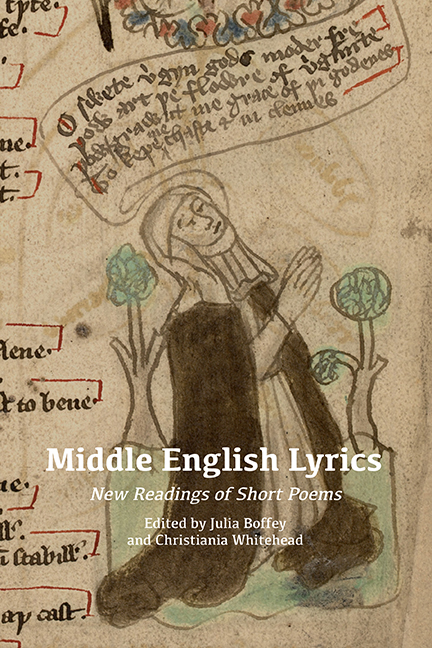Book contents
- Frontmatter
- Dedication
- Contents
- List of Illustrations
- List of Contributors
- Acknowledgements
- Abbreviations
- Introduction
- 1 Editing Issues in Middle English Lyrics
- Part I Affect
- Part II Visuality
- Part III Mouvance, Transformation
- Part IV Words, Music, Speech
- Afterword: The Study of Medieval Lyrics in 1960s Oxford and Today
- Bibliography
- Index of Manuscripts
- General Index
1 - Editing Issues in Middle English Lyrics
Published online by Cambridge University Press: 23 July 2019
- Frontmatter
- Dedication
- Contents
- List of Illustrations
- List of Contributors
- Acknowledgements
- Abbreviations
- Introduction
- 1 Editing Issues in Middle English Lyrics
- Part I Affect
- Part II Visuality
- Part III Mouvance, Transformation
- Part IV Words, Music, Speech
- Afterword: The Study of Medieval Lyrics in 1960s Oxford and Today
- Bibliography
- Index of Manuscripts
- General Index
Summary
In 1979, in his edition of Medieval English Songs, Eric Dobson castigated the established practice of the then chief lyric collections where:
[T]he texts of the manuscripts, as read by the editors, are mostly printed without even the most obvious necessary changes: abnormal spellings, false forms, bad rhyme and worse metre, irregular or impossible accidence and syntax, and even sheer nonsense left uncorrected.
Why this lamentable failure of editors to edit? The answer lay partly in the chaotically corrupt state in which Middle English lyrics have survived. However incredible it may seem, where these lyrics are found in multiple copies, in not a single instance are any two versions of any one lyric found to be identical. Textual variations in different copies of the same lyric frequently manifest differences in wording, in word order, in order of lines, and even in order of stanzas, differences sometimes so bizarre as to suggest that scribes must not only often have copied carelessly but may sometimes have done so from memory, and often from bad memory at that. Indeed, as in the instances where lyrics survive in shorter and longer versions, it is evident that rewriting sometimes entered into the transmission process. This state of affairs gave rise to the assumption that Middle English lyrics were, by and large, corrupt beyond repair, and that the traditional procedures of textual criticism revered by editors of previous generations were defeated from the start. In particular, it seemed impossible to analyse surviving manuscripts in terms of the stemmata of classical editorial procedure whereby manuscript superiority leading to the privileging of more authoritative readings could be established.
Yet another important requirement of traditional editorial practice was lacking. As E. T. Donaldson observed concerning Chaucer, ‘it is impossible to edit at all without having in mind some fairly strong preconception concerning the metre’. Whether one thinks of classical Latin poetry or, indeed, of Beowulf, metre has played a vital role in arriving at editorial decisions. In the case of Middle English lyrics, however, one will search the older standard editions in vain for any sustained discussion of metre. A notion commonly, albeit often tacitly, accepted was that lyric scansion was appropriately to be analysed in terms of the number of stresses per line.
- Type
- Chapter
- Information
- Middle English LyricsNew Readings of Short Poems, pp. 12 - 28Publisher: Boydell & BrewerPrint publication year: 2018



